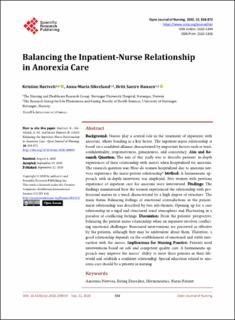| dc.contributor.author | Rørtveit, Kristine | |
| dc.contributor.author | Sikveland, Anna Maria | |
| dc.contributor.author | Hansen, Britt Sætre | |
| dc.date.accessioned | 2023-01-13T09:33:20Z | |
| dc.date.available | 2023-01-13T09:33:20Z | |
| dc.date.created | 2020-11-20T10:03:52Z | |
| dc.date.issued | 2020 | |
| dc.identifier.citation | Rørtveit, K., Sikveland, A. M., & Hansen, B. S. (2020). Balancing the Inpatient-Nurse Relationship in Anorexia Care. Open Journal of Nursing, 10(09), 858. | en_US |
| dc.identifier.issn | 2162-5336 | |
| dc.identifier.uri | https://hdl.handle.net/11250/3043267 | |
| dc.description.abstract | Background: Nurses play a central role in the treatment of inpatients with anorexia, where bonding is a key factor. The inpatient-nurse relationship is based on a confident alliance characterized by important factors such as trust, confidentiality, responsiveness, genuineness, and consistency. Aim and Research Question: The aim of this study was to describe patients’ in-depth experiences of their relationship with nurses when hospitalized for anorexia. The research question was: How do women hospitalized due to anorexia nervosa experience the nurse-patient relationship? Method: A hermeneutic approach with in-depth interviews was employed. Five women with previous experience of inpatient care for anorexia were interviewed. Findings: The findings summarized how the women experienced the relationship with professional nurses in a ward characterized by a high degree of structure. The main theme Balancing feelings of emotional contradictions in the patient-nurse relationship was described by two sub-themes; Opening up for a care relationship in a rigid and structured ward atmosphere and Fluctuating in a paradox of conflicting feelings. Discussion: From the patients’ perspective, balancing the patient-nurse relationship when an inpatient involves conflicting emotional challenges. Structured interventions are perceived as effective by the patients, although they may be ambivalent about them. Therefore, a good relationship depends on the establishment of emotional and stable interaction with the nurses. Implications for Nursing Practice: Patients need interventions based on safe and competent quality care. A hermeneutic approach may improve the nurses’ ability to meet these patients in their lifeworld and establish a confident relationship. Special education related to anorexia care should be a priority in nursing. | en_US |
| dc.language.iso | eng | en_US |
| dc.publisher | Scientific Research Publishing (SCIRP) | en_US |
| dc.rights | Navngivelse 4.0 Internasjonal | * |
| dc.rights.uri | http://creativecommons.org/licenses/by/4.0/deed.no | * |
| dc.title | Balancing the Inpatient-Nurse Relationship in Anorexia Care | en_US |
| dc.type | Journal article | en_US |
| dc.description.version | publishedVersion | en_US |
| dc.rights.holder | the authors | en_US |
| dc.subject.nsi | VDP::Medisinske Fag: 700::Helsefag: 800 | en_US |
| dc.source.pagenumber | 858-872 | en_US |
| dc.source.volume | 10 | en_US |
| dc.source.journal | Open Journal of Nursing | en_US |
| dc.source.issue | 9 | en_US |
| dc.identifier.doi | 10.4236/ojn.2020.109059 | |
| dc.identifier.cristin | 1850264 | |
| cristin.ispublished | true | |
| cristin.fulltext | original | |
| cristin.qualitycode | 0 | |

